#but irl it's another story
Explore tagged Tumblr posts
Text
I just want to be able to connect with people in real life to the same degree that I can online. I want to talk with people and do activities together and have the experience of being friends in an offline setting. How do I achieve that. Where I do find you people in the real world ;-;
#idk i swear it's just like i can fairly easily make friends with people online#but irl it's another story#been at grad school for 8 months and i have some nice acquaintance-level people but not really proper friendships#yknow that involve doing stuff outside of school and talking in class#and i don't want to be lonely#hate being lonely
9 notes
·
View notes
Text
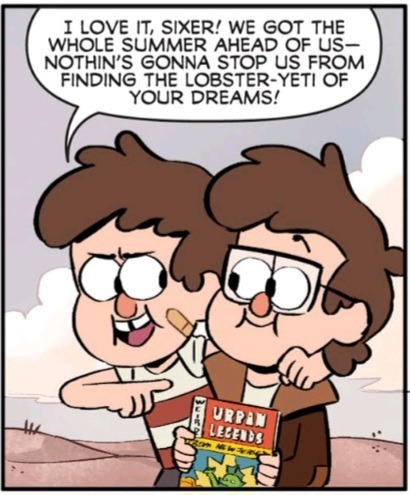
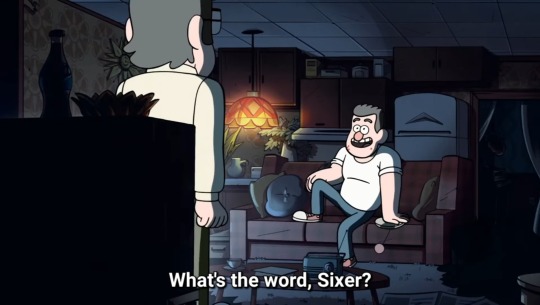
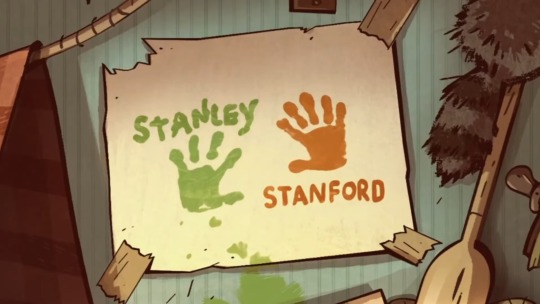



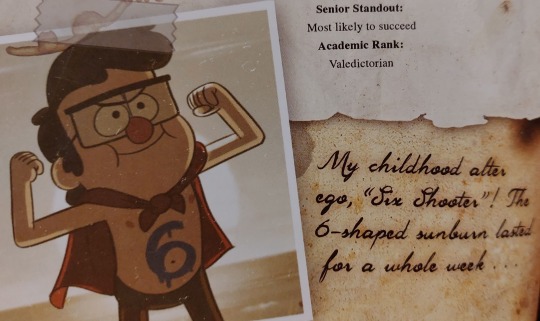
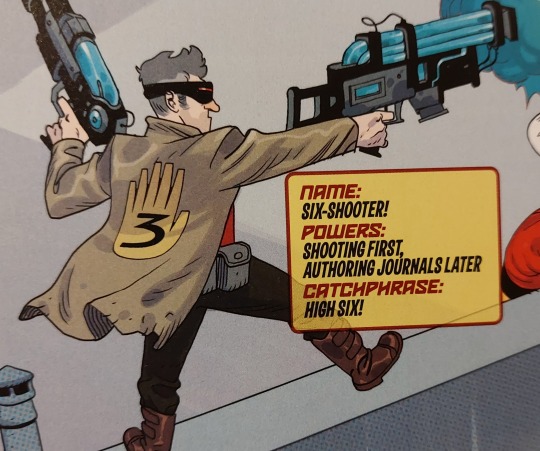
stan spending their childhood trying to make ford's polydactyly something positive in ford's life and genuinely believing its super cool....
#(that stan quote being from the extra dvd commentary)#but also stan loving comics and being like 'yeah ford's character is a superhero!' and then basically making himself charlie brown#stan's abaconings story basically being him blaming ford's smarts as the reason why they became estranged...#the contrast of bill telling ford 'nah it's your brains that makes you special and your hands makes you a freak!!!'#gravity falls#ford pines#stanford pines#stan pines#stanley pines#but also mabel causing high fives to be invented earlier#cos irl it was invented in 70s apparently#always uwu at paradoxes bringing this family together+closer#it's basically an intrinsic part of them!!!#oddities brought together by contradictions!!!#soos being brought to stan by the kids but the kids only doing so cos soos is part of their family!!!#(part of why same coin is so fun to me is cos it adds another layer of paradox to them)#but stan being insecure about his hands being smaller was not something i was expecting in 2024#(i thought he'd be more jealous that ford seems to have more dexterity especially considering stan's the one who pickpockets lol)#stan being defined by his love for his family arghhhhhhhhh
979 notes
·
View notes
Text
I'm sorry but the irony of Nico calling Max unprofessional is sending me so bad like sir there's an entire garage full of people, who were literally in the trenches trying to survive the Brocedes fallout while just doing their jobs, who might have a few things to say about your (& Lewis') level of professionalism at that time 😭✋️
#f1#formula 1#formula one#max verstappen#nico rosberg#lewis hamilton#brocedes#like niki lauda had to try multiple times to literally parent trap them to try and get them on speaking terms it never worked#because one would arrive they'd see the other and the other would leave#& if i remember correctly the garage crew would swap around from race to race as a like see we aren't favouring anybody gesture 😭#and thats no shade to nico because it was both of them contributing to that environment#his comment re max is just making me laugh#like if i was a part of the pr/media team - which is a part of the degree I'm working on irl - at merc that year i would've lost the plot#like its insane reflecting on it nearly a decade later but the poor souls just trying to do their job in the eye of that storm#truly gods strongest soldiers#ngl the professional comment irks me a bit because its not like max is engaging in inappropriate work place behaviour#he's engaging in another aspect of racing that his involvement raises awareness of & that makes racing more accessible#& we all know how inaccessible not only getting into racing is but also to continue to pursue the further along you go#theres so many stories of 1 sibling giving up racing so the other can keep going because the family can't afford for them both to race#its a huge financial strain & we only see a handful of drivers talk about that & try to do something to change it#and nicos fellow sky sports commentators are routinely unprofessional on so many levels#additionally max had a lot of valid reasons to be annoyed at his team today#but alas he's not english so he's ungrateful#i hate that drivers can't criticise their teams or car without immediately being branded as bratty & ungrateful#ESPECIALLY WHEN THEIR JOB IS TO GIVE FEEDBACK#you can see the double standards from sky when say Lando or George have complaints with their team/car v the likes of Max and Yuki#especially Yuki my god the things i would do to get the British media to leave him alone#this was a jokey post at one point and then became a rant whoops lmao#I'll leave it that before i write an actual essay here 😭✋️
572 notes
·
View notes
Text
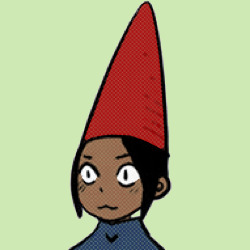
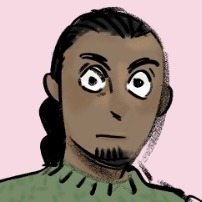
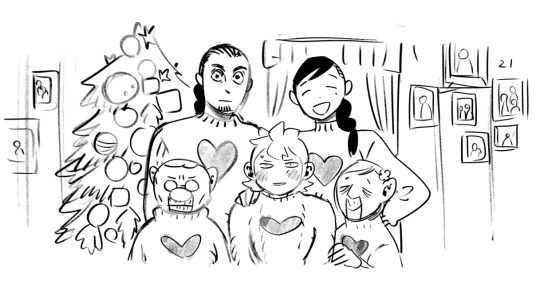
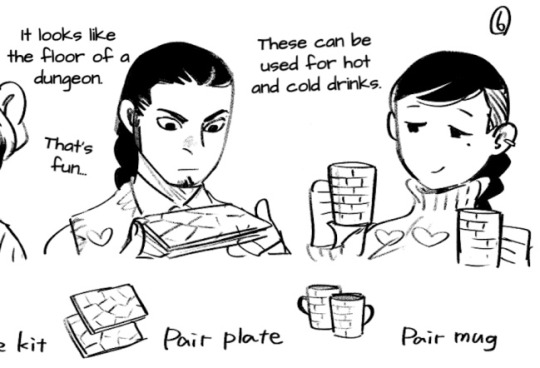
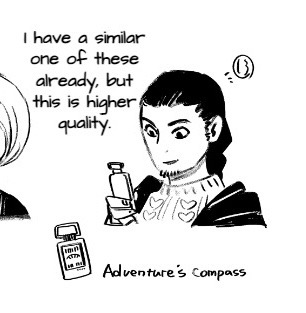
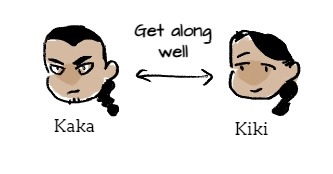
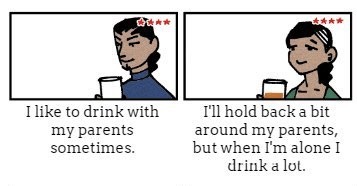
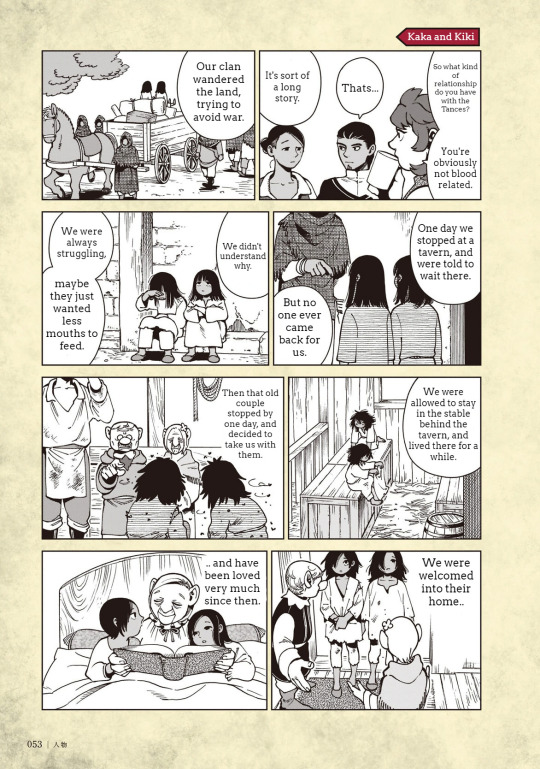
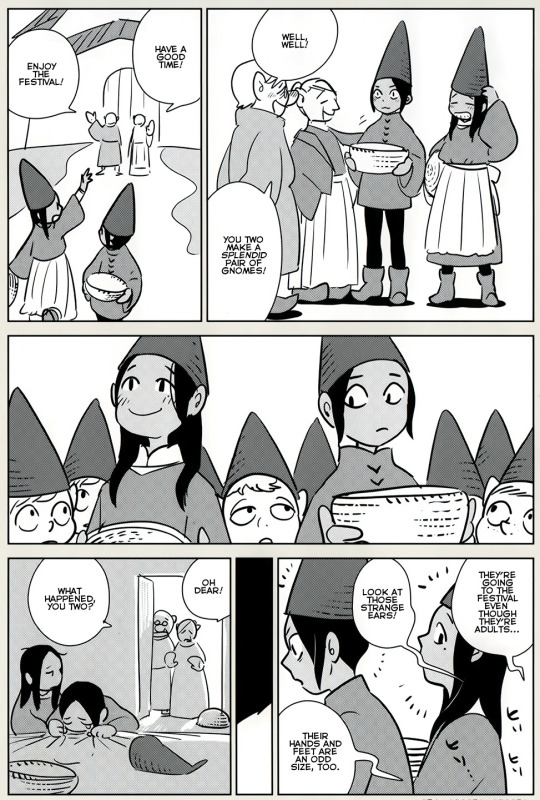
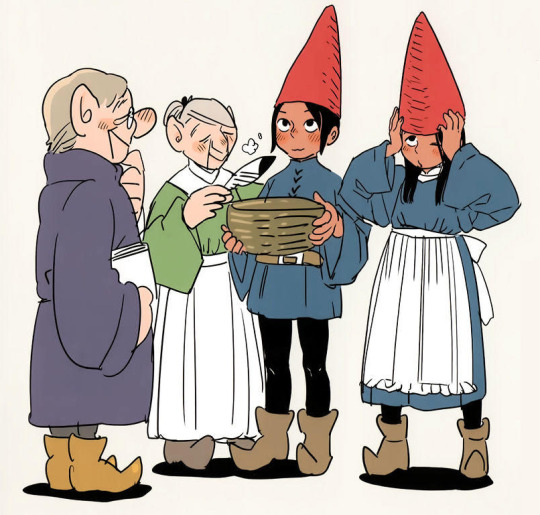
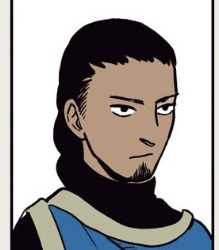
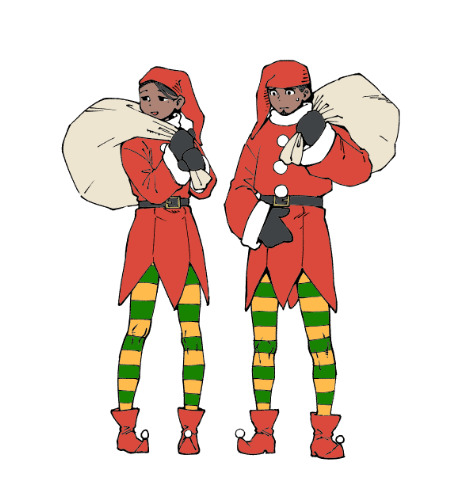
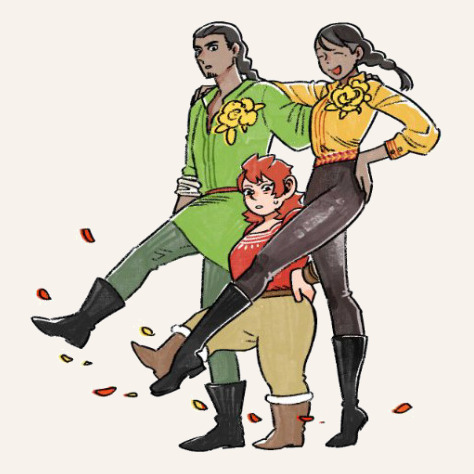
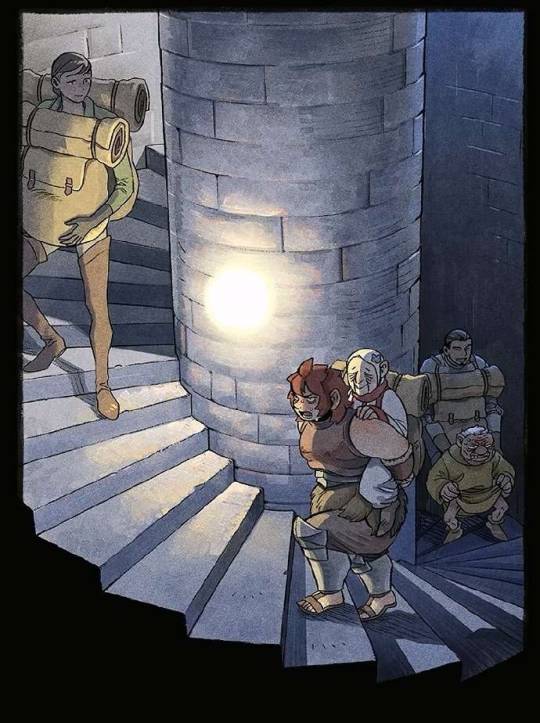
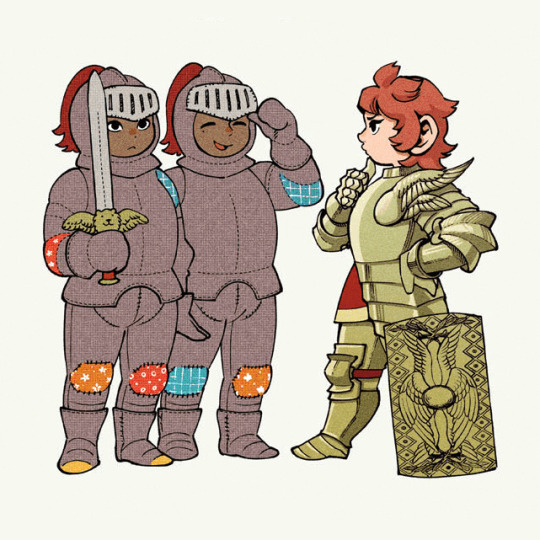
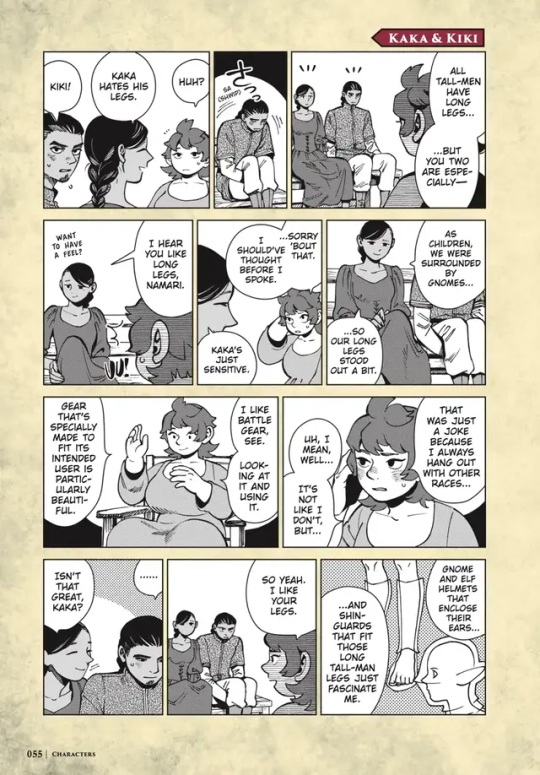
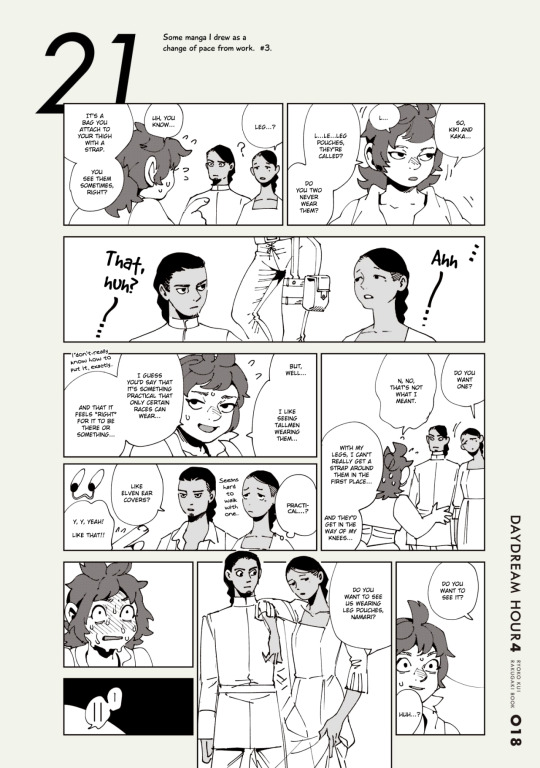
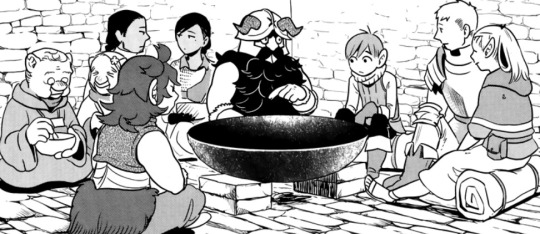
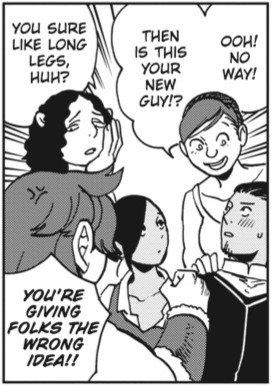
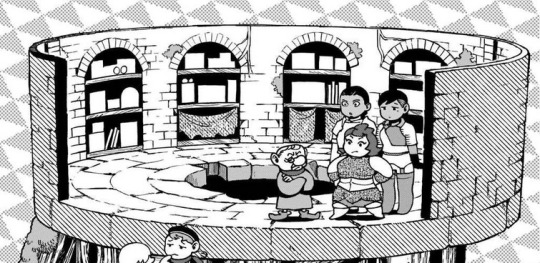
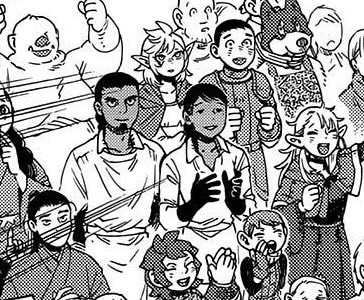
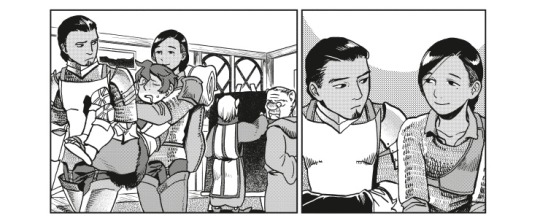

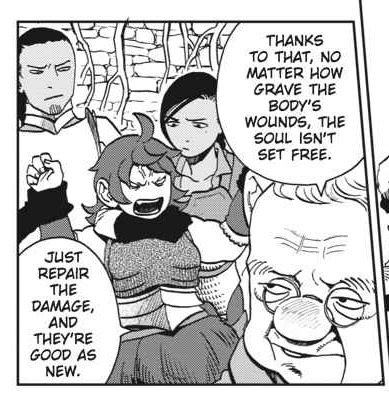

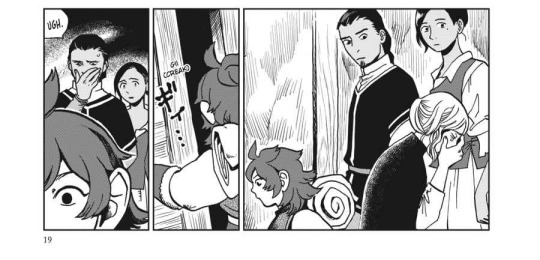
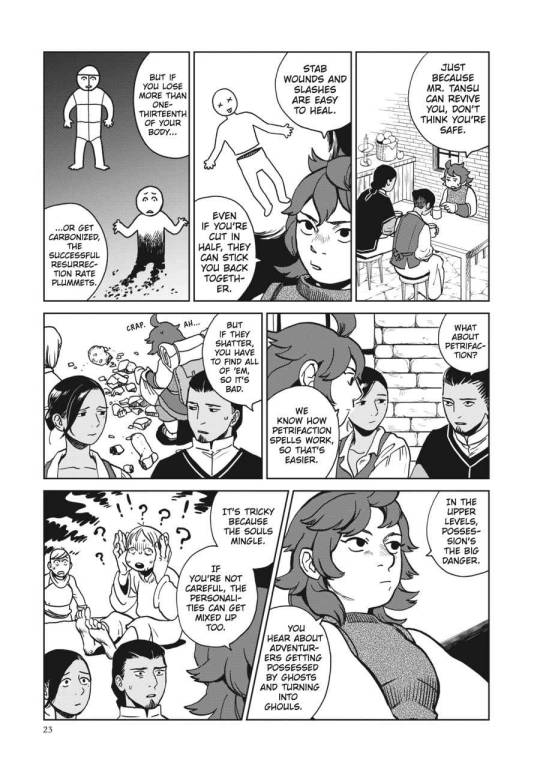
Kaka compilation
Because everyone is sleeping on him. Witness his greatness!! First two Kaka colored icons were colored by me, lineart by Ryoko Kui though!
Kaka & Kiki are kinda like Laios & Falin… Kaka being stoic and giving repressed energy like early Laios, Kiki being cryptic and always smiling and kinda soft-looking. Autism siblings 2, ostracized and othered as kids and have a deep bond due to sticking together through it all, though unlike with Laios their parents are very loving so Kaka developed family as a big value more than Laios (bc asides for Falin Laios doesn’t care much about it).
In the gnome festival comic you can see Kaka is more emotive than he seems! Full with a :3 face, and he’s the one crying at the end. He’s insecure about his legs and being tall… It really got to him. Conceal don’t feel. In the gnome festival comic you also see him sensing others’ gaze on him and that something is off unlike Kiki, again Laios-like in the way that judgement from others gets to him more than her.
#The twins are so autistic swag#A falin just as chilled out and smiling and a laios who never stopped repressing#They’re so neurodivergent and they’re allowed to just exist I love you Kui. Kaka is just literally me#I looove characters that are hard to know and hard to read/easily misunderstood. They’re my favorite thing#LOOK AT THE WAY HE SMILES THE WAY HE BLUSHESSS HE’S PERFECT and I would take a harpoon to the chest for him thank u#I do love Kiki too btw but I’ve been seeing her in fancontent and posts way more than Kaka so I had to give him some spotlight#But also Laios is my fave of the Toudens so this very much checks out#Their pre-Flokes story would be interesting to analyze too#Dungeon meshi#delicious in dungeon#kaka floke#Kaka#Kiki and kaka#floke twins#As you may guess from my new-ish icon I am in my kaka era#ALSO I SWEAR TO GOD STOP BEING MEAN ABOUT HIS NAME#KA IS A SYLLABLE IN MY IRL NAME. YES I WAS BULLIED AND CALLED KAKA AS A KID. MY NAME ALSO MEANS UGLY STUFF IN A DIFFERENT LANGUAGE#KAKA’S A PRETTY NAME I’LL DIE ON THIS HILL. IT’S NOT WEIRD IF YOU DON’T MAKE IT WEIRD#Oh also another laios falin parallel: they both sort-of-date the same woman
882 notes
·
View notes
Text

mithruns of the week...eat well beautiful
#mithrun#dungeon meshi#dunmeshi#delicious in dungeon#my art#I HAVE FOUND MYSELF...IN THE DUNGEON...OF MITHRUN THOUGHTS ONCE AGAIN...!!!#tbf i opened the gate and put myself in there (and gladly)#it felt like coming home#im a longtime manga enjoyer but only recently finished s1 of the anime#and if u have been following my art u might know me as a resident on inumaki island#which is why i crashed out so hard when i found out mithrun is voiced by kouki uchiyama...aka INUMAKI'S VA!!!!#his onigiri connects us all...#this has happened to me three times now (re: finding out uchiyama voices my favs) but that a story for another time#ok so about mithrun#i just really wanted to draw him eating#oh and with a different hairstyle each time too bc why not#my favorite is the short cut...KYAAA#love thinking about mithrun relearning how to live#captain u are so cool...#its been awhile since my last mithrun hyperfixation but thanks to hourly mithrun on twt i am so back#additionally i really ship kabumisu and will hopefully be drawing them soon....#yapping a lot bc its been awhile since i was able to draw like this...ive been so busy with irl work everyday nonstop#drawing mithrun was so healing...#i was debating if i should color this or something but kind of caught myself trying to make this smtg more than it should be#bc the demons in my head were saying u shld color this bc then it looks more complete and nicer to post#so i said SHADDAP i wanna post now so i fawking will...#yay
105 notes
·
View notes
Text
funny thing that happened to me today:
I was on the phone with my dad, and we talked about the news. I told him I'm a bit scared because of the current political situation.
Dude asks me why I'm scared, and then, get this, he goes: Do you even know what exactly fear is?
BRO.
OH DO I KNOW WHAT FEAR IS.


When I tell you I was flabbergasted.
#this is so funny to me but also so sad#just another example of my parents not knowing anything about me bc they don't give a shit 🤡#the context was that he was questioning my knowledge and intelligence btw#he also didn't give me any comfort - if anything he made it worse#my entire family (minus my brother and I) is far right so you can already guess who they support#well anyway the whole fear thing was too funny not to post#scarecrow and psychology are literally two of my biggest interests like bruh#jonathan crane#dc#batman#the scarecrow#scarecrow#there is nothing to fear but fear itself#fear#news#world news#scared#silly#irl story#V's life#family#dad#stupid
37 notes
·
View notes
Text


















A conversation about prom (that's subtextually about something else entirely)
[ next ]
I said here that I wanted to do gameplay set in 2008 with the VC cast. Now you may say: "Where gameplay?". To which I will respond, it's coming I swear! (lol)
I still have to make everyone teenagers pft. I intended to start at the end of the summer 2008 which would place them going into college but decided I wanted just a bit of high school drama as a treat.
#ts4#ts4 story#vc:2008#morgyn callaghan#darrel diamantis#<- pulling out the in-universe legal names#we're getting serious here#this will update...whenever I make them#probably another this week#maybe we'll get a schedule at some point#im moving irl this week so no promises
24 notes
·
View notes
Text
Caranthir: Did you know that the entomological root of pencil, penecilin, and the word for a male body part is-
Maedhros: Which word?
Celegorm, whispering: pen- *laughing*
Caranthir: Maedhros, please don't.
Maedhros: No, really. I don't know what word you're talking about.
Curufin: Maglor was saying a word for it earlier.
Caranthir: I hate all of you.
Maedhros: Just say the word, it isn't a bad word.
#irl story at bottom of tags cause of course this is a crazy quote off of my siblings#lotr#lord of the rings#incorrect lord of the rings quotes#silmarillion#incorrect silmarillion quotes#incorrect quotes#maglor#maedhros#caranthir#celegorm#curufin#based on a true event between my two younger siblings me and our mom#our mom was acting oblivious to what word it could possibly be#my youngest sibling was trying to say it but kept laughing their head off#I was telling them it wasn't a bad word and was the one who “said” a word for it(it had been part of another word/wasn't actually saying it)#my younger sibling was the one who refused to say it and was embarrassed by our attempts to get them to say it(it wasn't in public at all).
84 notes
·
View notes
Text

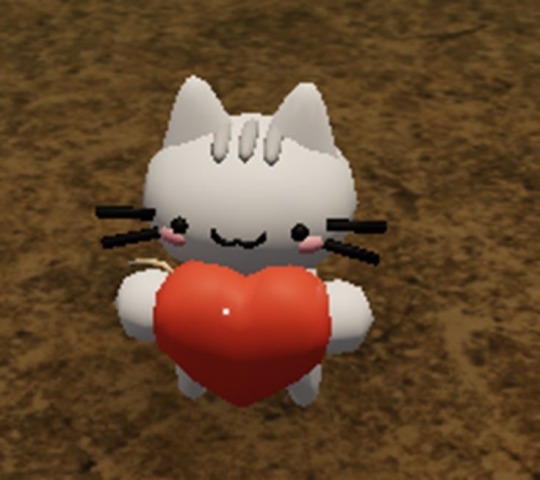

#PHEWWWW HI GANG#im writing this via tumblr web so bear with me but i hope everyone’s 2025 has started off well so far !!!!!! a lot has happened on my end#(the good and the bad but we are thugging it out!)#i’ve received very wholesome messages from my lovely moots which i’ve taken a sneak peek of and will be replying to when i get the time !!#anywho! i don’t know when i’ll be back on here bc my creative juices have been DRAINED so yeah :C i didn’t wanna leave completely so i#archived my acc for a bit while i sort things out :3 — my reason for doing so is mixed really. more on losing motivation and just basically#stuff to worry about irl BUUUUT i missed you all so much and me being here and making a post means its kinda getting better on my end so ya#prob not relevant but i’ll enable my asks again if anyone wants to leave anything so that i can come back to it again when i log on sjdnksj#also also i’ve been watching ‘the apothecary diaries’ s2 and its so amazing !! i also started ‘a sign of affection’ and let me tell you how#much i was kicking and rolling around my bed KSNDKSJ#gaming-wise i recently pulled for c0 arlecchino but lost her weapon to clorinde’s weapon 😭🙏🏼 but shes amazing and i love her gameplay sm!#AND AND OMG LADS.??. WELCOME BACK CALEBBBBBB OMGGG i havent done the main story yet but i’m excited !! i know ppl have mixed feelings over#him and his actions but hes so up my alley so ik im gonna be eating it up hehe. i did manage to pull for his standard 5 star which is#exciting too !!! anyway i want to try and get back into writing again because my mind has been brewing yet another heavy chrollo angst 😽#(i love putting my husband through grief)#or maybe i’ll start w finishing off a couple of loose ends from the fics i never finished 😭 (i’m so sorry)#welp that’s all from me !! i love u all <3
22 notes
·
View notes
Text
I always thought that handcuffs were kinda stupid. As a little kid I would watch movies where the bad guys were hauled away in cuffs and I'd always think "alright, I guess that's inconvenient for them?" but I never really understood why they didn't just... take them off and escape
This curiosity heightened when I saw that my aunt had real metal handcuffs that locked with a real key and I quickly, before any adult could see what I was doing, shackled both my wrists with the cuffs as tight as they could go.
And when I say tight, I mean tight. I had reaaaaal skinny wrists and I was a child wearing adult handcuffs, so you'd think the cuffs would be loose but nope. Those things weren't circular anymore, they'd folded in so much that they looked more like the shape a cat's pupils turn when they're mad.
And what they don't tell you about real handcuffs? Those suckers are sharp. The inside edges are almost bladed, I guess to discourage exactly what I was trying to do but that certainly didn't stop my curious lil neurodivergent brain, oh no no.
Anyway, after about five minutes of pulling, straining, huffing and puffing, I finally went to find the adult with the key.
I was so disappointed.
And so, so hopelessly confused.
Course, no one questioned why I had locked my aunt's handcuffs and why I needed them unlocked. And, of course, I didn't communicate my confusion in any way.
So it wasn't until way later in life, when I had quickly shimmied out of one of those indestructible water park wristbands and saw the horrified eyes of my friends watching me with morbid glee, that I discovered that, apparently, most people can't dislocate their thumbs at will.
The moral of the story here is that neurodivergent children have no concept of typical versus atypical and that I cannot be contained by your petty mortal means.
#personal#tangent#irl story#i was just thinking about this cause I saw yet another movie with handcuffs and my reaction immediately was confusion#and i had to stop. and be like 'no. that person is STUCK. they aren't just playing along because handcuffs are a universal time out rule'#because yeah. i did think that everyone was just really polite and chill about the universal handcuff timeout rule...#and not that they actually just... couldn't get out#imagine not being able to fold your hands into a perfect cylinder the same size as your wrist tho. wild. how u live like that?#it took me five minutes to get out of the handcuffs CAUSE THOSE FUCKERS ARE SHARP#anyway i don't wanna know why my aunt had those#im neurodivergent i dont ask questions
154 notes
·
View notes
Text
February 1899: Precious cargo arrives in Cairo

“I have a feeling you’ve been waiting quite some time for this particular shipment.”

Posted the last chapter of my long fic, When We’re Older, to AO3 this past weekend! Thank you to everyone who has been with me along the way, and thank you thank you THANK YOU to @myokk for illustrating Theo and Seb’s reunion 🤍 You can read When We’re Older in its entirety at the link below!
#Sebastian sallow x mc#Sebastian sallow x slytherin!mc#sebastian sallow fanfiction#there is such a hangover to finishing a story you’ve been writing for over a year#I’m out here IRL pretending I didn’t just write a book????? wow#fanfiction is amazing and I’m so glad I found my way back to it with this fic#it wasn’t about the longfic it was about the friends we made along the way#still probably gonna torture Sebastian sallow someway or another#Theo Caulfield the woman you are
52 notes
·
View notes
Text
Another year older today!🌷
Wish I was able to draw something, but my brain was (still is) a total wasteland lately. A barren land. I try to reason with myself it's a time to rest and gather inspiration reading, watching and researching stuff, but you know how it goes - still frustrating. Pls wish me to get some of my creative juice back again soon 🥲
#kinda stuck irl too but that's another story#still figuring that out#otherwise all's good over here#going to spend my day at a beach#nothing like cold-ass baltic sea am I right
60 notes
·
View notes
Note
Little Sprout: what happened with big us?
Current Sprout: ................ *INCOHERENT SOBBING-*
yeahh- *sniffles*
#asks#god 2al had changed so much#and holy shit tysm to the people who have stuck with it for all this time#the au is over 10 months old#year anniversary around the corner...#man#like I know the whole au lost some traction after *gestures to twist* but#im still so happy to keep writing the story#waugh#holidays are crushing me atm with fam taking up my free time#and there were some other irl stuff that happened beforw then but#I hope to get back into a weekly schedule#maybe....#and im not sure exactly when#might be in like#another 2 to 4 months????????#but theres going to be another poat an update every day of the week event im excited to get to#that and oh boy#that 3 minute long animation project im slowly getting through#augh#tangent#im just emotional over this au man#my baby#changed so much#for the better or worse doesnt matter to me
103 notes
·
View notes
Text
Tumblr isn't letting me find again @fictionadventurer's and my own posts on epistolary novels, but I have been thinking about it again, because I fell down a Goodreads review rabbit hall and I have thoughts again.
So many people dislike the style, and honestly, I don't blame them, because it's so often done... not well. It is in some aspects, a deceptively easy one, and in others, deceptively hard. And because I'm trying to write a novel with this format myself, I have been thinking about what makes or breaks an epistolary novel.
I talked yesterday about TGLPPS, because it is an interesting case to analyze. I have thought many times about it, and cannot think of a single non-merely-aesthetic reason for it to be told in an epistolary style. A lot of it depends on -British- people who have survived some terrible war conditions willingly opening up to a stranger about their experiences, and that's made... even more difficult if the medium is letters? typically writers will appeal to tropes like making the reserved character drunk, or have them share an extreme experience in isolation with the stranger to create sudden intimacy. None of this is possible in writing; if anything, one is much more self-conscious about the things one writes than the things one says; verba volant, scripta manent.
It seems to me the story would have flowed much more naturally if Juliet had been stranded on Guernsey for some reason -like the first author herself!- suddenly Dawsey commenting that he got a book from her library makes so much more sense! Yes, certainly, if you met a stranger out there, and they introduce themselves and you realize you have a book that once belonged to them, you would tell them so! And it is in this way that the epistolary format does violence to a story that would otherwise sound much less contrived.
Another problem is the large cast of characters and multiple settings. For all I complain about Dracula, Stoker manages this pretty well (of course he has the model of The Woman in White, but TWiW has fewer povs), at least on the first half, because structurally the storylines of the characters are converging, and that does a lot to guide the reader in the understanding of the character's relationships. TGLPPS's relationship structure is more of a multidirectional flow chart, and that becomes confusing really fast.
Another novel I read reviews for recently is one set in WWI, composed of back and forth letters between two lovers torn apart by war, and one common complaint was... that the climactic scenes, the times they meet, etc all happen... off-camera. It is a fair complaint, but also one I cannot really blame the author for, because that's what usually happens with real life compilations of letters of that kind. Sure, usually the editor/compiler will fill in the blanks sometimes and add an epilogue of sorts explaining what happened afterwards, and that is possible if you are writing it fictionally too, but some may think it spoils the effect of immediacy and whatnot, which, fair too.
But it makes me think of how aware Jean Webster was of these difficulties, and how deftly she managed them in both Daddy Long-Legs and Dear Enemy. Both novels have aged badly in terms of content and message, but they are very interesting stylistically.
DLL is a bildungsroman with a dash of romance; through Judy's letters to daddy long-legs we can see how she grows as a person, gaining independence intellectually and economically, and as a writer, as her grammar and vocabulary change and grow. Between making Judy an orphan who hates the orphanage where she has lived her whole life, and one where she lived past the usual age of being thrown into the world, Webster does away with the need for letters between Judy and her friends and family: all her friends and family are her college roommates and her benefactor, who is the person she writes to. The benefactor scheme also makes it so that she doesn't have to write dll's replies, which in turns makes it much more natural and acceptable for the reader when Judy writes him the ending's love letter describing the feelings and impressions of their finally meeting in person and in truth; Judy has become a writer, and she is so used to write to him as another person all the time, that it just makes sense for her to write to him one more letter at the point where her benefactor and her lover become one and the same person. She has written a novel where the core is the correspondence between lovers AND managed to include as well all the moments of their meetings that we would otherwise miss.
Dear Enemy is a similar, but longer and more ambitious story. Instead of one relationship-connection (Judy and Daddy's), we have Sallie as a nod of connections: she's Judy's friend, Jarvis' "employee", the boss of several characters, has a tense colleague-boss relationship with the visiting doctor, a boyfriend of sorts in Washington, and a family we have met before. It is, in that way, a similar setup to TGLPPS: a urban girl of means becomes a fish out of water in a different setting till she ends up assimilating to it, and settling definitely through marriage. But Webster does a few things differently to make it click.
For starters, it is clear to her that this is the story of Sallie's maturation -I have sometimes talked of Dear Enemy as a novel where a Mary Crawford-like character undergoes a transformation arc. The happenings and stories she meets and tells Judy about along the way serve this arc, besides standing on their own as case studies to illustrate the problems, ideology and solutions proposed to the secondary themes of the story (education and social reform). I feel like TGLPPS is much more interested in Guernsey's survival through the war, in which case Juliet's story is already a frame, which, again, makes the epistolary format cumbersome rather than complementary.
Dear Enemy adds more correspondents, but it is very austere/economical with them, and narrows the letters we see to only those Sallie sends. YMMV regarding if it was too much cutting or not, but the undeniable effect is structural soundness; you are never confused by what is happening or who is writing to whom. We can guess the Honorable Cyrus Wykoff probably wrote some indignant letters to Jervis, and those would be funny to read, but... would they be worth the break in the flow of the narrative? I don't think so. To this effect, just having Sallie write a line to the effect of "I expect at this point you have at hand an irate letter from the Hon. Cyrus" is enough to paint a picture for the reader. Perhaps a letter or two from Dr. MacRae would have helped develop his character more -definitely a first read of the story obscures how much misdirection there is in Sallie's narration to Judy, which in turns tends to create an impression of suddenness to the closing letter that doesn't come across well to the reader.
The choice of Sallie mainly writing to Judy is, IMO, a really good one too. It not only establishes a connection with DLL, but it also allows for the intimacy that makes disclosure believable (something TGLPPS struggles with, as I mentioned above). When you add a few letters to the doctor and Gordon and Jervis, you also get a better perspective of Sallie's personality, how she deals not only with a friend, but with acquaintances, romantic partners and coworkers.
From all this it is pretty evident that for Webster the main function of epistolarity as format is aiding in showing psychological and moral development. But that's not the only thing the format can be really good for: perspective is another, and Austen uses it to great effect in both Lady Susan and Lesley Castle.
Both stories deal with mainly static characters, but who have very strong perspectives of the same situation, and it is this singularity of setting and story that anchors the narrative to avoid confusion, while the variety of perspective brings interest. In Lady Susan, we are dealing mainly with the marrying off of Frederica and seduction of Mrs. Vernon's brother, Reginald. There where Lady Susan paints Frederica as an undisciplined, irrational and ungrateful daughter, her sister in law, Mrs. Vernon, paints her as a sweet girl and a victim of her mother's ruthlessness and lack of love. Both agree that Reginald is being seduced, but, of course, with opposite goals: Lady Susan wants him to succumb, Mrs. Vernon, to escape, and this is a delicious struggle for the reader to follow!*
Lesley Castle being an earlier effort, and unfinished, does show some of the defects I have mentioned before (mainly, the relative confusion of having several correspondents in separate storylines), but illustrates well this same perspective effect: Margaret writes to Charlotte about the new Lady Lesley, and the new Lady Lesley writes to Charlotte about about Margaret and her sister... and in these contrasts lies the main interest of the narrative.
Some conclusions to these musings, then:
Not every story is suited to the epistolary format.
The epistolary format seems to work the best when it is used for either A) showcase psychological and moral development B) to play with perspective on people and/or events.
One of the main difficulties of the format is finding a narrative element to anchor and structure the letters around.
It must have a core couple of correspondents, or at most, two. More than that will make it confusing (unless, perhaps, the story is very short and about a single event or two).
A delicate balance must be found so that the secondary correspondence doesn't cut the flow of the main one, and if possible it must feed into it.
*It is interesting how Love and Friendship, being such a delightful -and I sustain one of the best ever- Austen adaptation, is by force of the perspective switch towards a more impersonal third person, more about a love story between Frederica and Reginald than a struggle between Lady Susan and Mrs. Vernon. Which isn't dissimilar to how adaptations of DLL end up being more about the romance between the leads than Judy's coming of age in college; tropes aside, I feel like if the epistolary format is well embedded in the story, it's going to be nearly impossible to reproduce the effect in adaptation.
#writing#epistolary novels#Jane Austen#Jean Webster#Daddy Long-Legs#Lady Susan#Dear Enemy#Lesley Castle#Thinking about Percival and Nadine of course#and how in the end it is trying to be both a psychological and a perspective story#And that might be more than I can chew#But the story is definitely about growth and change in the main character and love interest#And perspective seems so necessary too#Eleanor is the last person alive Percival feels responsibility for#Of course he'd write to her in a light way with jokes and anecdotae#so that she doesn't worry about him#whereas in day to day life he does not have the energy to behave so towards others around him#and both things are important to understand him!#It's the other way around with Nadine#she keeps the cheery façade IRL but can relax when she writes to Beth#And both seem so necessary to me!#But then there *are* things neither tells to anyone and those I'm struggling hard with#I have considered adding journal entries as well back and forth#and remain unconvinced one way or another#anyways this is the way I'll spend 10 years writing an 80 page novelette at this point XD
29 notes
·
View notes
Text
Y’all I’m reading Yellowface for the first time and I know I’m late to the game but this is genuinely a terrifying reading experience, I’m afraid for my life
#to clarify i mean this in a good way#literally not since oppenheimer have i been this fucking stressed out about a story#every time you think ‘surely this is a bit heavy-handed’ you remember another debut author scandal that happened irl#like remember the goodreads review-bombing drama(s) that was absurd#and that author who faked like 3 different identities? what was their name it’s driving me nuts#something moon? whatever they were a trainwreck#also having war flashbacks to the hivliving scandal#for my under-20s: look it up it’s ridiculous#anywho i love a tag yap let’s do it again sometime
7 notes
·
View notes
Text
Like...the way some of y'all are treating these FICTIONAL characters it's like you actually want to be able to marry them instead of treating them like idk characters in a story????
#this is specifically about lads discourse#but can be applied to a lot of things#love and deepspace#lads#lads caleb discourse#lads caleb#i like the man cuz he's a fucked up little freak#not cuz i wanna marry him irl#love and deepspace caleb#also specifically not about people liking characters#more the expectation that the characters shouldn't be able to break the perfect husband mold#let characters be fucked up#make fucked up descisions#and so on and so forth#cuz its a story#and not an actual dating app#(ofc there are lines that probably shouldn't be crossed but that's another discussion)
16 notes
·
View notes